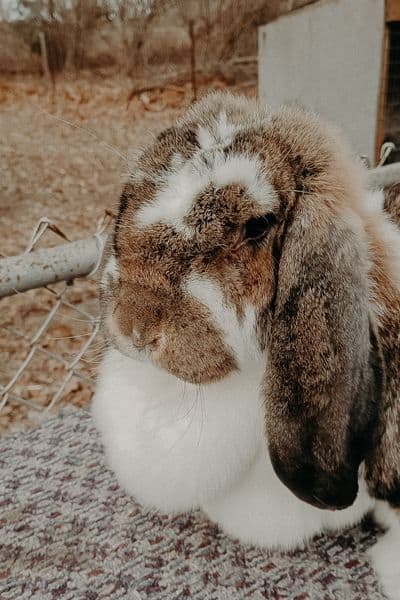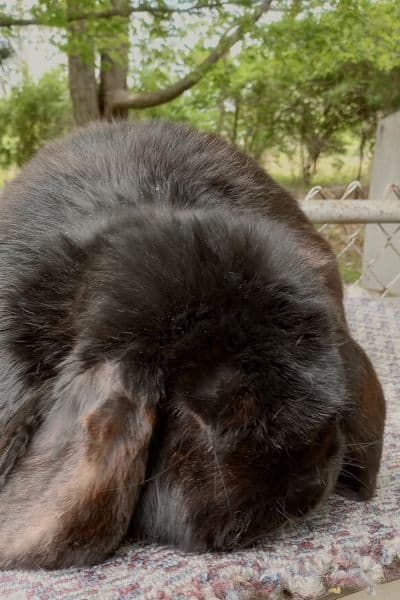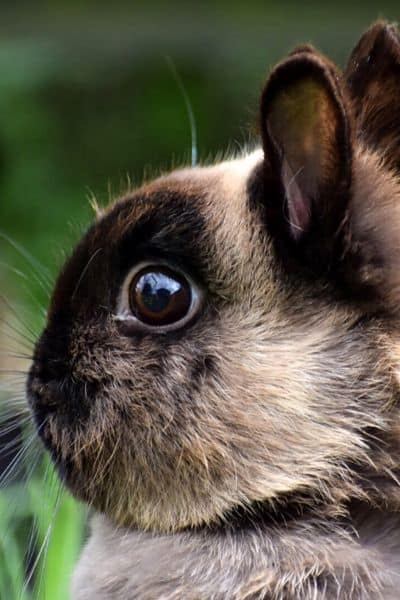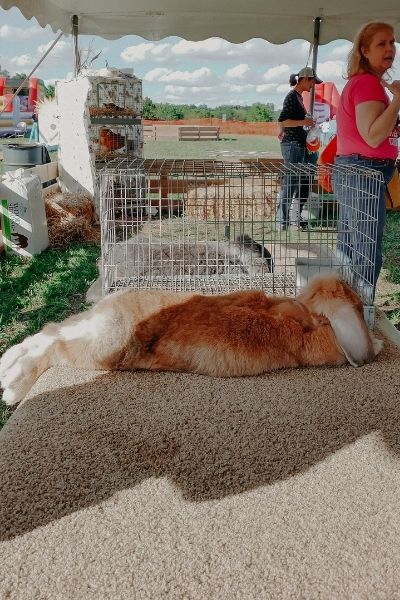What To Feed A Rabbit – Beginners Guide
What to feed a rabbit is one of the hardest things to get a straight answer on.
One person says you need to feed your pet rabbits mostly leafy greens and fresh vegetables then another person (like me) says you should go all pellets and very little leafy greens. ddddaaaaa its enough to drive you crazy.
Then you get into the right brand of feed….🤦🏻♀️
You ask one person and they swear by one brand of feed. You ask another person about the brand and they will tell you that you are a horrible rabbit owner if you use that brand. It can be a scary thing to ask questions when people are so opinionated.
Before we go any deeper let me tell you that this is a judgment-free zone with any question about rabbits. Everyone starts somewhere. My favorite saying in this area is “you don’t know what you don’t know.”
I will tell you what I would do and how I raise my rabbits and why. Then the ball is in your court and its up to you to take my advice or leave it on the table.
Ok ready to get into what to feed your rabbits?

Nutritional Requirements Of Rabbits
Let’s start with what your rabbit needs then I am going to blow you out of the water and maybe even step on your toes about what a rabbit should be eating in order to get these levels of nutrients.
Here is the “guaranteed Analysis” or nutritional value you need to be looking for in your rabbit pellets. You will find these numbers on the feed tag or on the back of your rabbit feed.
- Crude Protein – min 16%
- Crude Fat – Min 3%
- Crude Fiber Min 20% Max 25%
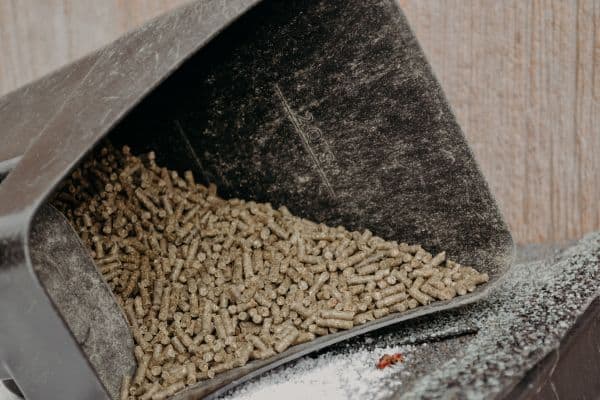
These are THE MOST important part of a rabbits diet. If the pellets you are looking at do not meet these levels you need to move on to a different brand. You should also look for alfalfa pellets for the first ingredient, not timothy-based pellets because alfalfa is the highest in protein.
Most times the lower protein feeds are sold in pet stores or in the pet section intended for the “house pet” and come in 10-pound bags of feed or less. This burns a fire inside me because they are feeding your rabbits poorly for a reason.
Go to the livestock section at a farm store and find brands like Purina, Mana Pro, Blue Seal, Nature Wise or something that comes in larger quantities like a 25-50 pound bag.
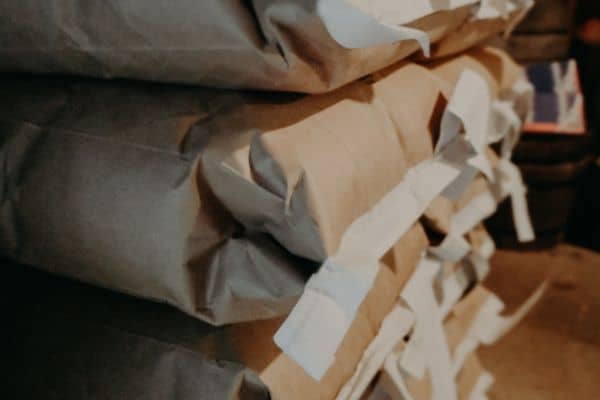
This will not only save you money but the protein levels will be much higher. Even if you have one small rabbit breed the pellets will stay good if you keep it in a dry place and out of the sun.
Hay and Leafy Greens Are Not High Enough Protein
Ooooohhhh call me a rabbit hater. 🙄
Your rabbits DON’T NEED fresh fruits and leafy greens.
Vegetables and fresh greens like mustard greens, romaine or iceberg lettuce, and other fresh foods that are less than 3% protein. You are being pushed to feed your rabbit these things in the name of a “balanced diet” and it couldn’t be further from the truth.
Think about it. If you push your rabbit to eat all of these things like alfalfa hay, oat hay, timothy hay, and fresh goods like carrot tops or other fresh vegetables before they eat their commercial pellets your rabbits are essentially starving because they are getting less than 1/5 of the sustaining food they need.

You can’t survive on vegetables and lettuce and neither can your rabbits. Even herbivores need protein.
The average hay protein percentage is 12% and a lot of what is sold in stores is LESS THAN 10%!!! your rabbits need 16-18% protein in their diet. That is NOT a good ratio.
When you are only giving them the lower protein first they fill up on the lower amounts and have no room to eat enough protein from the alfalfa-based pellets.
Free Farm Goal Planner!!!
➡️Get my proven system for choosing your farm goals so you don’t get burnt out.
Supplementing Feed Will Not Save You Money In The Long Run
I see so many people in homestead groups saying to feed rabbits veggies or other things from the farm to save on money but here is the problem with that.
When any animal is not fed the highest level of nutrition possible they are going to fill out as well. Taking them longer to make weight. If your goal is to provide your family with meat you are going to have to feed the rabbits longer before you can butcher them.
Costing you more because you have to feed them longer. Any new idea you think will save you time and money think it through before acting on it and taking someone else’s word for it. — Including me.
Have a strategy for reaching your dream country lifestyle goals. – This guide will help you out with that.
You Don’t Need To Feed Hay To Keep A Rabbit Healthy
There are two main reasons people think rabbits must have hay in their daily diet to survive and it’s honestly a hill they are willing to die on. Personally, it’s misplaced thinking.
People think rabbits need hay to keep rabbit’s digestive tract moving. Well, here’s the thing it’s the FIBER that keeps the rabbit’s gut moving not the hay itself.
Their body doesn’t know where the fiber came from so long as they get it. So why risk the other digestive issues that can come from feeding hay if you can’t keep it dry.
The second argument is for dental health to keep their teeth short and ground down… Um, have you seen how much rabbits chew on their living quarters? Rabbits are going to find what they need to not have overgrown teeth.
Pellets are far stronger and stiffer of a consistency than hay is and rabbits will chew just as long on hay as they will on pellets.

Rabbit Daily Feeding Schedule
It’s just as important to know your rabbit’s eating habits, as well as what you feed them.
Rabbits are funny creatures and their health is closely linked to their diet. The first sign of a health issue in a rabbit is it will stop eating.
This is one of the key reasons I recommend feeding each rabbit separately rather than having one bowl for all of your rabbits if they live together. (FYI I don’t recommend rabbits live together at all and you can find out why here.)
If you raise rabbits for show or commercial use then most likely they are separate anyway. If you raise them is a colony or as house pets, this becomes more difficult. Regardless, do your best and try to feed separately if you can or find a way to watch the rabbit at feeding time to see how they react when you bring them their food.
A very common mistake in rabbit raising is over-feeding causing feed waste. Like I said rabbits are funny animals and if their pelleted food gets any moisture in it even from humidity they most likely will not eat the leftover food.
Only feed what the animal will clean up from one feeding to the next. If there is a large amount of feed left over from the day before, reduce the amount you give them the following day.

Also, look under the caging area to see if they are spilling the feed. If you have ornery bunnies they love to be stinkers sometimes and throw their bowls around. If there is no new feed under the cage then you know the bowl was empty.
French lops are very strong and it takes a lot to keep a bowl from being thrown around. One thing to try is to give them something specific for throwing to discourage them from pulling their feeder off the cage wall and throwing it. I will caution you to be VERY careful about which toys you give to your rabbits. They get abscesses VERY easily and you do not want to give them something that causes them to poke their mouth even a little bit. Make sure whatever you give them won’t get shards of the material if the rabbit chews on it.
If they are really bad about throwing their bowl with feed in it. I give them the amount they are going to get and if they skip a meal that’s their problem. This usually stops the problem really fast. Kind of like sending a kid to bed without their supper. It makes them think twice before doing it again.
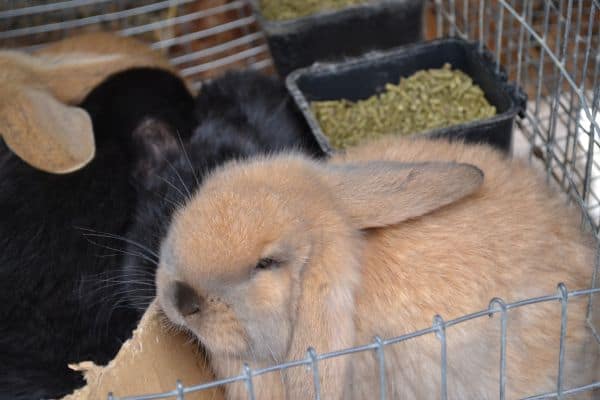
Why Buy Commercial Rabbit Pellets
Buying a quality pellet is the best and easiest and most consistent way to feed your rabbits. They can vary in quality as well as price.
The biggest factor in which feed to get for your rabbits is what the feed dealers around you have. Seems like a “duh” statement but if you can’t get something close to home there is no reason to try it.
Be warned of buying pelleted food at a pet shop or grocery store in small 5 to 10-pound bags. Especially if it contains colorful “treat pieces.” You will be paying as much as 5X more per pound for this feed than if you buy at from a farm or feed supply store by the 25lb or 50lb bag.
Even if you only have one or two rabbits I still recommend looking into a farm store or feed dealer because they have far more reasonable prices than pet stores. If you keep the feed in a dry place it won’t go bad for a very long time.
So before stressing too much about which feed is right for you, go to places like Tractor Supply or Rural King and see what they have first. I am sure there are other feed supply stores around if you google them.
Pelleted rabbit rations will provide all the nutrients your rabbit needs.
Those pretty packaged treats, vitamin blocks, hay bags, and other tempting options down the pet aisle were put there for you my friend. Not for your rabbits. If you are feeding a good feed they have the full nutrients needed for your rabbits.
Rabbit Feed Guaranteed Analysis Example
- A guaranteed analysis is the list of minimum amounts of nutrition in that bag of feed or in the amount recommended for one feeding.
- All animal feed ingredient lists are in order of the highest amount in the feed to the least.
A rabbit’s feed should contain 16-18% protein. For show feeds, you will often find higher numbers in protein and sometimes fiber as well as a few other ingredients. This goes back to do what works for you. If your rabbit is not going on the show table then there is no need for more complex feeding.
The feed should also be approximately 4% fat, and at least 18% fiber. Pregnant and nursing females can use a slightly higher protein content, but an 18%+ protein content is too rich for many small rabbits so you may want to bring it down to 16% once the babies start venturing out of the nest box.
Any good pet food should have a G.A. label stating what is in the feed.
You should also watch out for “least cost formulas” which do not have a fixed list of ingredients. By this, it means they buy whatever is cheapest at the time. They often are not very fresh and as ingredients get old they lose their nutritional value.

How much pellets to feed your rabbit?
The best rule of thumb is to feed your rabbits the amount that they will clean up in 24hrs and they are ready and waiting for you to feed the next day. Happy to see you have food but not starving either.
Here is why I don’t say feed multiple times a day or just keep it full. When rabbits get sick their first indicator is they stop eating or eat less. You won’t know if they are feeling bad if you are constantly keeping their feeder full.
To make this work well you need to choose a time of day that you can feed them on a consistent basis. Sure there will be days when life happens and you have to feed a bit later or earlier but 95% of the time you feed at 6 pm every night, 6 am every morning, or whatever time works for you.
Here is an idea of how much to feed your rabbit based on pounds of body weight.
- Rabbits under 6 pounds – 1/4-1/2 Cup of pellets
- Rabbits 6-9 pounds – 1/2-3/4 Cup of pellets
- Rabbits 10 pounds and UP – 1 cup to 1.5 cups of pellets. (this is the bracket my french lops fall into)
Here is the important thing to remember. Some rabbits have a higher metabolism than others. You may have a more energetic breed that burns more energy.
Example: My french lops are a super lazy breed and while they do eat a lot the New Zealand rabbits I watch for people when they are out of town eat just as much.
I also have the occasional french lop that eats less than the rest but is not losing weight. She just eats less. Her teeth are fine and she never has soft stools. So learn what your rabbits need and stick to what works.
Safe Treats You Can Feed Your Rabbits
Vegetables like dandelion greens and romaine lettuce should be fed as the occasional treat only.
The saying “everything in moderation” is true for rabbits as well. The first reason for that is rabbits have very sensitive digestive systems and changes cause them to get sick or even go off feed completely.
Rabbits are also stubborn critters when they want something. If they get a taste for a particular food, similar to a sweet tooth, they will only get small amounts of they can essentially get addicted to it and only eat the treat and not their own food.
I had a rabbit that decided she only wanted to eat the supplement and it took almost two weeks of barely eating anything before she caved and started eating pellets again. She lost A LOT of weight but she would not survive only eating the supplement. Needless to say, we were done with the fun stuff.
This is why I am very careful when using supplements (or fresh fruits) intended for better flesh conditions or fur because often there is a sweet flavor to them.
Below is a list of common foods you can find in the produce section at the grocery store.
I will go over this more in a second, but the main thing I want you to keep in mind is to avoid veggies with high amounts of water or that seem to cause gas. Some green vegetables like cabbage and broccoli are the worst offenders. Gas builds up in the rabbit’s intestine and can cause bloat. You may not catch it until it is too late.

Recommended treats in limited quantities:
- Alfalfa
- Apples (best to remove seeds),
- Apricots
- Banana Peels (or the whole thing but I eat the banana and they get the peel)
- Blackberries (any part of the plant)
- Blueberries
- Raw beets
- Carrots
- Pumpkin seeds
- Soybeans
- Sunflower seeds
- Turnips
- Raspberries
- Strawberries (or the tops if you eat them and don’t what to waste the tops)
- Alfalfa Sprouts
- Beet greens
- Bell peppers
- Kale
- Nappa
- Pumpkin
- Squash
- Swiss chard
- Spinach
Food To Void
If you intend to feed your rabbits hay. Be sure it is not dusty or has mold which can cause some serious upper respiratory infections. I wrote a whole blog post on why I DO NOT feed hay. Yep, you read that right. I don’t feed hay to my rabbits and they is the one thing I do not plan to change. You can find out why here.
- Celery ( the strings can cause your rabbit to choke).
- Cucumber
- Collard greens can cause bladder sludge
- Eggplant leaves and stem
- Lettuce – It is best to avoid foods with high amounts of water which can cause diarrhea in rabbits.
The best thing to do if you are not sure about food is don’t feed it to your rabbit. Simple as that. Treats can lead to behavior issues that are hard to fix anyway.
Get help and find motivation as we build our intentional backyard farm together.
Keep A Constant Supply Of Fresh Water
Of course, keep rabbitts waterer full at all times, especially in the summer. If you have a large rabbit I recommend using a large heavy water bowl they can’t flip over. Ceramic bowls are great for smaller breeds but these are some large rubber bowls that even my giant breed rabbits can’t flip over.
I don’t recommend a water bottle because they tend to leak and don’t hold enough water for rabbits over 10 pounds anyway.
What To Feed A Rabbit Is A Learning Process
I have had at least one rabbit for 20+ years and my own rabbitry (herd of rabbits) for 17 years. Like anything, you learn by doing. Adult rabbits tend to drink 30+ ounces of water and if you raise rabbits’ hand have a litter of baby rabbits you will need a lot more water.
There are things I have learned that I have not found in any books. But I wouldn’t have figured them out without trying. I want you to keep in mind that you need to do what is working for you. If your animals are healthy then ignore what other people are saying about the feed.
So the key is to be in tune with your animals and be able to pick up on it when something is wrong.
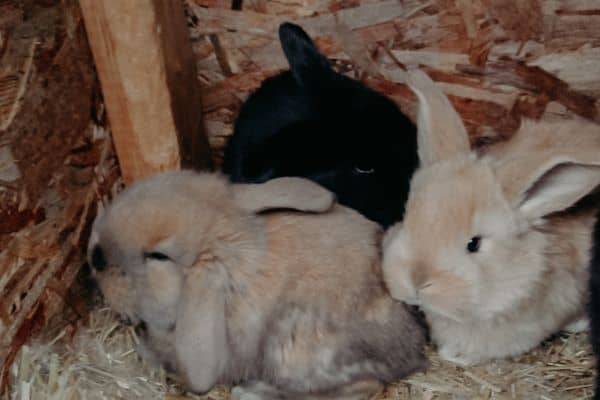
If you want to get your money-sucking hobby to start paying for itself you should think about generating income from your rabbitry. The profitable rabbitry playbook is my business book created for rabbitry owners and the exact path I used to get my small rabbitry to earn multiple four figures a year.
Check out the profitable rabbitry playbook here.

